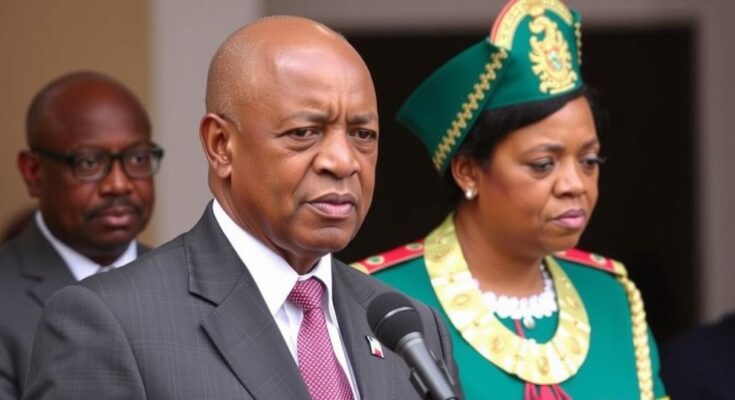Mozambique inaugurated its new president Daniel Chapo on Wednesday amid violent protests and claims of electoral fraud by opposition leader Venancio Mondlane. Following heightened tensions resulting in over 300 fatalities, Chapo promised to focus on national unity while Mondlane threatened ongoing demonstrations. Observers criticized the election for irregularities, and the international response has been tepid, indicating regional hesitance to recognize Chapo’s win.
On Wednesday, Mozambique’s new president, Daniel Chapo, formally assumed office amidst heightened tensions following weeks of violent protests linked to controversial election results. The inauguration took place in Maputo before a fortified assembly of dignitaries, as Chapo, representing the Frelimo party, continues its lengthy tenure, now exceeding 50 years. The electoral process has faced significant backlash from opposition leader Venancio Mondlane, who claimed electoral irregularities, a stance that has contributed to widespread civil unrest resulting in substantial loss of life.
During his oath-taking ceremony, President Chapo committed himself to fostering national unity, protecting human rights, and enhancing democracy. However, opposition leader Mondlane issued a stark warning threatening daily protests aimed at disrupting the government following his calls for a national strike in anticipation of the inauguration. Mondlane, noted for his influence among the youth, alleges that the recent elections heavily favored the ruling party through manipulation.
“This regime does not want peace,” stated Mondlane, underlining the challenges ahead. He proclaimed intentions to persist with protests, indicating a firm resolve to confront the new administration. In his comments, Chapo called for stability, expressing aspirations for collaborative development across the nation despite the prevailing unrest and concerns highlighted by international observers regarding election integrity.
The inauguration was marked by a notable absence of foreign heads of state, leading analysts to suggest a reluctance to acknowledge Chapo’s victory. Security measures were intense, with police shutting down major roads across Maputo as protests simmered. According to reports from local civil society, unrest since the election has seen fatalities exceed 300, with heavy scrutiny placed upon law enforcement’s conduct towards demonstrators.
Looking ahead, President Chapo is anticipated to announce his cabinet soon, and analysts suggest that including opposition figures may be a necessary measure to mitigate tensions. Dialogue has been hinted at, even though Mondlane has been conspicuously omitted from preliminary discussions between Chapo and other political leaders. Mondlane expressed his willingness to engage in negotiations, reiterating, “I’m here in the flesh to say that if you want to negotiate… I’m here.” As the political landscape continues to unfold, the government’s response to ongoing unrest remains pivotal for Mozambique’s stability.
The recent political turmoil in Mozambique follows the conclusion of a contentious electoral process, which has been characterized by allegations of voting irregularities and widespread civil disobedience. The election, which took place on October 9, 2025, saw Frelimo party candidate Daniel Chapo declared the victor amid fierce opposition from Venancio Mondlane, the leader of the Podemos party. These events underscore long-standing tensions in Mozambique’s political climate, which has been molded by decades of Frelimo governance since its independence in 1975.
In summary, the inauguration of President Daniel Chapo amidst protests and violence conveys a nation grappling with significant political strife. The claims of electoral malpractice and the ongoing tensions led by opposition figures pose serious challenges for the new administration. As Mozambique faces a crossroads, the actions taken by President Chapo and the government in the immediate future will be critical in determining national stability and reconciliation efforts. Engaging with opposition leaders like Mondlane may prove crucial to restoring peace and trust within the populace.
Original Source: www.france24.com




